Lutherans are taking action across the country! Below you will find our monthly State Advocacy Newsletter. Share with your friends!
____________________
Washington, D.C. – Amy Reumann, Director of Advocacy
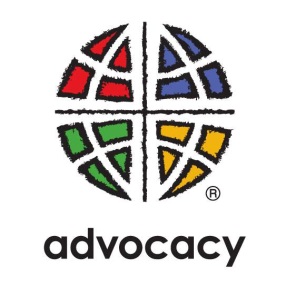 LENTEN ADVOCACY REFLECTION SERIES: During Lent, ELCA Advocacy is sharing weekly advocacy reflections from state and national policy staff. You can read the first Lenten Advocacy Reflection on Ash Wednesday and other weekly reflections at the ELCA Advocacy Blog.
LENTEN ADVOCACY REFLECTION SERIES: During Lent, ELCA Advocacy is sharing weekly advocacy reflections from state and national policy staff. You can read the first Lenten Advocacy Reflection on Ash Wednesday and other weekly reflections at the ELCA Advocacy Blog.
INTERNATIONAL HUMAN TRAFFICKING: On Feb. 1, the House of Representatives passed the Trafficking Prevention in Foreign Affairs Contracting Act (H.R. 400), a bill that seeks to ensure the U.S. government does not contract with companies and organizations that employ trafficked people at U.S. embassies and other governmental posts.
The legislation would require the U.S. Agency for International Development and the State Department to give recruiters and contractors clear guidelines so that our government’s employment practices overseas do not support debt bondage, one of the tools traffickers use to trap people into this appalling and illegal practice. The bill has been referred to the Committee on Foreign Relations of the Senate for further consideration.
#ELCAVOTES: With the 2016 elections right around the corner, we are called to conversation and prayer around our role as U.S. residents and as people of faith in ensuring our election systems promote dignity and respect for all. As part of this initiative, the ELCA is involved in planning and implementing the 14th annual Ecumenical Advocacy Days gathering April 15-18. People of faith will speak against the suppression of political and economic rights and the corporate undermining of the voice of ordinary people in the U.S. and around the world.
Through prayer, worship, advocacy training, networking and mobilization with other Christians, the gathering will face the reality of racism, class and power impacting politics and policies and will advocate for the liberty of “Every Voice!” – all culminating with Congressional Lobby Day on Capitol Hill. Interested advocates can sign up for the ELCAvotes updates here, and join ELCA Advocacy in Washington, D.C., for the Ecumenical Advocacy Days at advocacydays.org/.
UPDATES AND ACTION ON FLINT, MICH.: Last month, the Rev. Jack Eggleston of the Southeast Michigan Synod shared his experience of visiting Flint, Mich., which has an ongoing water crisis. With some government support and generous response from the synod, ELCA World Hunger, and people around the ELCA, Salem Lutheran Church is now one of the largest distributors of fresh bottled water in the city. Michigan Democrat Sen. Debbie Stabenow and several Midwest Republicans have since proposed legislation that would procure funding for Flint and cities facing similar lead crises. You can take action on the Flint assistance bill at the ELCA Advocacy Action Center, and read the full version of Pastor Eggleston’s reflection at the ELCA Advocacy Blog.
____________________
New York, NY – Dennis Frado, Lutheran Office for World Community
COMMISSION ON THE STATUS OF WOMEN: The 60th session of the Commission on the Status of Women will take place at the United Nations in New York March 14 – 24. The theme is women’s empowerment and its link to sustainable development. Delegates will also review the 57th session agreed conclusions on the elimination and prevention of all forms of violence against women and girls.
LOWC will host 35 Lutheran delegates, including representatives from The Lutheran World Federation member churches in Brazil, Indonesia, Democratic Republic of Congo, Malawi and the U.S., as well as the Geneva communion office. LOWC will also co-sponsor several side events with the World Council of Churches, ACT Alliance, Islamic Relief Worldwide, World Young Women’s Christian Association (World YWCA), and the Greek Orthodox Archdiocesan Council.
DPINGO BREIFING ON GLOBAL MIGRATION: On Feb. 18, Nicholas Jaech of the Lutheran Office for World Community attended a briefing by the U.N. Department of Public Information/Non-Governmental Organizations on the current global migration crisis. This briefing aimed to educate NGOs on refugees fleeing conflict and war, but emphasis was also made on people displaced as a result of climate change and natural disasters.
The U.N. High Commissioner for Refugees representative reiterated some sobering statistics: 60 million people are currently forcibly displaced, which is the highest number since World War II. In 2014, 42,500 people were forced to flee their homes every day, and there were a total of 13.9 million newly displaced people, which is four times higher than in 2013. The European Union representative noted Europe’s “legal and moral obligation” to provide protection to these refugees and called on the European Union to reform its migration management systems.
The UNICEF representative noted that of the 4.7 million refugees in Syria, half are children. She also noted that in 2015, 39,000 unaccompanied children were apprehended at the U.S./Mexico border. She outlined UNICEF’s support, including technical assistance for coordination, access to education, reuniting children with parents and psychological support for children.
ZIKA BRIEFING: On Feb. 16, LOWC attended a briefing on the Zika virus by the U.N. Economic and Social Council. The World Health Organization announced that 34 countries have reported cases of the virus, while an additional six countries have indirect evidence of local transmissions. They noted that the virus is spread by the Aedes mosquito and the geographical spread of the virus will continue in countries where this mosquito is found. In addition, the Centers for Disease Control and Prevention spoke about efforts to work with international public health partners to detect and report cases and support diagnostic testing and the development of new technologies.
____________________
California – Mark Carlson, Lutheran Office of Public Policy
EARLY CHILDHOOD EDUCATION: February opened with an Early Childhood Education Advocacy Day at the Capitol. Sponsors included the California Association for the Education of Young Children and the California Alternative Payment Association, two professional organizations that relate to services provided by many ELCA-affiliated preschools and child care centers. Other sponsoring organizations represented providers who lease church facilities for Head Start and State Preschool. LOPP-CA Director Mark Carlson’s legislative-visit team members were private providers from San Luis Obispo and San Diego and appreciated the “tour guide” services and “moral” support. A briefing from the speaker-ele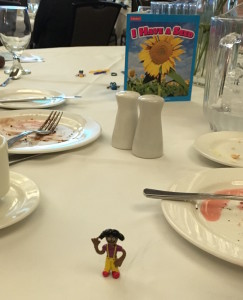 ct and legislative budget staff provided context for Gov. Jerry Brown’s proposal to consolidate early childhood funding in block grants to local education agencies, potentially threatening the diverse mix of providers. Although $276 million of the $1 billion in recession era cuts was restored last year, the governor’s proposal is mainly seen as a cost-containment strategy and not a commitment to reach the tens of thousands of unserved eligible low-income children.
ct and legislative budget staff provided context for Gov. Jerry Brown’s proposal to consolidate early childhood funding in block grants to local education agencies, potentially threatening the diverse mix of providers. Although $276 million of the $1 billion in recession era cuts was restored last year, the governor’s proposal is mainly seen as a cost-containment strategy and not a commitment to reach the tens of thousands of unserved eligible low-income children.
Late in February, the annual Watercooler Conference of early education stakeholders drew about 400 people to Sacramento, sponsored by First Five California, the state Department of Education, and The Advancement Project, a civil rights organization. Attendees heard from legislative leadership, administration officials, authors and academics, including a keynote by the director of the Stanford Center on Poverty and Inequality. Early brain development and the toxic effects of poverty were once again emphasized, along with the importance of wealth redistribution programs like the earned income tax credit.
____________________
Colorado – Peter Severson, Lutheran Advocacy Ministry Colorado
FAITH ADVOCACY DAY: Faith-based advocates from across Colorado joined together at Colorado Faith Advocacy Day on Feb. 20. Under the theme “Income Inequality: Who Gets Left Behind?,” the attendees were addressed by keynote speaker Rep. Faith Winter, who shared her experience working in public policy at the municipal and state levels trying to ensure that low-income women and families aren’t left behind.
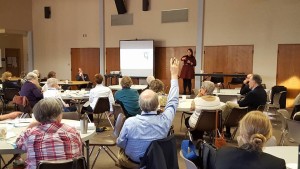 Panelists from the Colorado Fiscal Institute, 9to5 Association of Working Women, and Family Promise of Greater Denver helped illuminate different aspects of the issue. Thanks to all who attended! Be sure to join us again next time.
Panelists from the Colorado Fiscal Institute, 9to5 Association of Working Women, and Family Promise of Greater Denver helped illuminate different aspects of the issue. Thanks to all who attended! Be sure to join us again next time.
LEGISLATION: Lutheran Advocacy Ministry-Colorado is working hard on our legislative advocacy agenda as the session nears its halfway point. We are supporting HB 1050, which creates a task force to identify child care barriers for low-income parents returning to school; HB 1004, which creates measurable goals for the state’s climate action plan; HB 1227, which exempts teen parents and victims of abuse and violence from the requirement to pursue child support from non-custodial parents in order to receive child care assistance,and several other proposals yet to be introduced, including renewal of the state’s low-income housing tax credit. LAM-CO testified with a broad coalition against SB 64, which would have removed the requirement for jury unanimity to impose the death penalty. The bill was defeated by a bipartisan vote.
____________________
Illinois – Lutheran Advocacy Illinois
Lutheran Advocacy – Illinois closed in February. A message sent out to its network made the following announcement: Lutheran Social Services of Illinois (LSSI) has been put in the challenging position of responding to the extended state budget impasse and continuing to provide services to those in need. A plan was created to restructure services for the viability and continuation of the organization, resulting in the closure of more than 30 programs and the elimination of more than 750 positions. As a result of these closures, approximately 4,700 people will no longer receive services from LSSI.
One of the positions eliminated was Jennifer De Leon’s, who was the LSSI director of government relations that included being the director of Lutheran Advocacy-Illinois, the ELCA’s public policy office in Illinois. We want to thank Jennifer for the tireless work she did advocating for the most vulnerable in the state. She has been a powerful voice bridging the gap between legislators and the church for more than 11 years. Jennifer has been a true asset and blessing not only to LSSI, but to Lutheran Advocacy-Illinois. From this point forward, Lutheran Advocacy-Illinois will be disbanded. We encourage you to continue to reach out to your legislators and continue to advocate and pray for those whom Jesus called the least of these.
____________________
New Mexico – Ruth Hoffman, Lutheran advocacy Ministry New Mexico
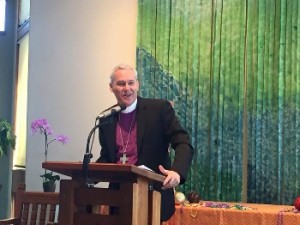 On Feb. 4, Rocky Mountain Synod Bishop Jim Gonia hosted the LAM-NM Bishop’s Legislative Luncheon and Issues Briefing. In the morning briefing, more than 100 advocates gathered to learn more about legislative issues, and about 140 attended the luncheon. Lutherans were joined by many ecumenical partners at both events.
On Feb. 4, Rocky Mountain Synod Bishop Jim Gonia hosted the LAM-NM Bishop’s Legislative Luncheon and Issues Briefing. In the morning briefing, more than 100 advocates gathered to learn more about legislative issues, and about 140 attended the luncheon. Lutherans were joined by many ecumenical partners at both events.
The 2016 session of the Legislature is history. Sessions in even-numbered years are so-called “short sessions” in which the passing of the state budget is the main focus. As the price of oil continues to tumble, the budget passed and sent to the governor made cuts of more than $100 million and used one-time funds to avoid deeper cuts. New Mexico is overly dependent on oil and natural gas revenue after slashing personal and corporate income taxes over the last 12 years. While Medicaid received about $20 million in additional funding, the program was directed to take cost-containment actions, which could impact benefits and enrollment. LAM-NM was able to successfully advocate for a small increase in the state-funded SNAP supplement program for seniors and people with disabilities.
A constitutional amendment to reform the state bail system passed and will be on the general election ballot in November. LAM-NM particularly supported changing the state constitution so that non-dangerous defendants cannot be detained pre-trial because they can’t post a bond. LAM-NM was also part of a coalition that successfully supported the passage of driver’s license changes, which maintained the authorization for undocumented immigrants to retain and obtain driver’s licenses.
____________________
Pennsylvania – Tracey DePasquale, Interim-Director
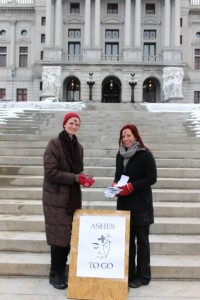 Eight months into a fiscal year with no budget and in the midst of a debate over ousting Pennsylvania’s embattled attorney general, LAMPa and ecumenical partners offered “Ashes to Go” at the state Capitol. The prayer and marking of the start of Lent was met with gratitude, even by those who did not receive. See coverage here and here.
Eight months into a fiscal year with no budget and in the midst of a debate over ousting Pennsylvania’s embattled attorney general, LAMPa and ecumenical partners offered “Ashes to Go” at the state Capitol. The prayer and marking of the start of Lent was met with gratitude, even by those who did not receive. See coverage here and here.
On Feb. 17, Interim Director Tracey DePasquale and Alaide Vilchis Ibarra of the D,C, office taught a class of first-year field education students at Lutheran Theological Seminary at Gettysburg about advocacy in the ELCA.
On Feb. 22, Tracey accompanied Lutherans from the West Berks Mission District and LIRS at a rally to protest the continued operation of the Berks County Family Detention Center, whose state license had expired the day before. The facility houses undocumented immigrant families. She also participated in environmental advocacy training with PA-Interfaith Power and Light held at the Northeast Pennsylvania Synod offices. 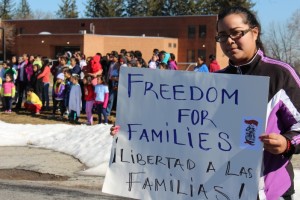
On Feb. 23, Tracey accompanied Joyce Ray, Lower Susquehanna Synod Women of the ELCA president, to meet with Senate Judiciary Committee Chair Stewart Greenleaf about Safe Harbor legislation.
Registration has opened for Lutheran Days in the Capital: “Stirring the Waters – Faith, Science and Action!” The event is part of the Gettysburg seminary’s Spring Academy Week and features advocacy training and celebration, an ELCA Glocal event in the Capitol Rotunda, and a canoe trip guided by the secretary of the state Department of Conservation and Natural Resources.
____________________
Virginia – Kim Bobo, Virginia Interfaith Center for Public Policy
Neill Caldwell, Communications Director
The Virginia Interfaith Center for Public Policy and the Virginia Consumer Voices for Healthcare co-sponsored a press conference on Feb. 17 at the General Assembly Building in Richmond, featuring several faith leaders who had signed a letter to the legislators asking them to close the Medicaid coverage gap. They were only a representation of the nearly 300 religious leaders who signed the letter. “How is it that living in this great and blessed commonwealth of ours, Virginia, that in the midst of all of this greatness, we are giving consensus to allowing more and more of our citizens to fall into vulnerability?” said Imad Damaj, founder of the Virginia Muslim Coalition for Public Affairs.
An estimated 400,000 Virginians fell into an insurance coverage gap created when the state did not expand Medicaid as the Affordable Care Act intended. A 2012 ruling from the U.S. Supreme Court made Medicaid expansion optional for states. Advocates say the lack of Medicaid expansion has left some of the most vulnerable people out of luck when it comes to health insurance coverage, as they are not poor enough to qualify for Medicaid and they don’t earn enough to qualify for subsidies to buy insurance on the health insurance exchanges. Virginia’s Republican-controlled House and Senate have rebuffed attempts by Gov. Terry McAuliffe to expand Medicaid. The House of Delegates instead has offered additional funding to free clinics around the state. “Funding for more clinics is a woefully inadequate response” to the crisis, Kim Bobo, the new executive director of the Virginia Interfaith Center for Public Policy, said in response.
____________________
Washington – Paul Benz, Faith Action Network
Our Legislature’s 60-day session began on Jan. 11 and will be over soon; the last day is March 10. Three weeks ago, Faith Action Network (FAN) gathered 270 advocates together from 39 of our 49 legislative districts for Interfaith Advocacy Day, during which advocates attended 108 meetings with legislators or their staff.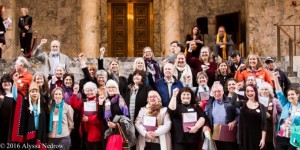
Some of FAN’s key bills that are still alive include:
- Breakfast After the Bell, which increases access to breakfast for kids from economically disadvantaged households.
- The Voting Rights Act, which will address disenfranchisement within communities of color caused by broken election systems and will allow jurisdictions to find solutions that work for that community.
- The Use of Deadly Force Task Force will bring recommendations for better police-community standards.
- School vouchers for homeless youth.
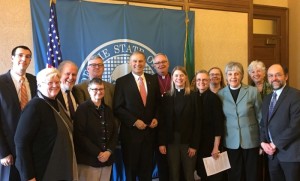
FAN coordinated a meeting of religious leaders with the governor, where a main topic was about the divisiveness between parties in the Legislature. Afterward, the group issued a statement on the need for civility in the political process.
After the legislative session, FAN staff look forward to denominational spring assemblies and beginning our issue work groups (economic justice, the environment, and health care, etc.) at our four regional summits in Spokane, Seattle, Vancouver, and Yakima.
____________________
Wisconsin – Cindy Crane, Lutheran Office for Public Policy in Wisconsin
February was a significant month in the Wisconsin Legislature.
PROTECTING CHILDREN: The Assembly and Senate passed a significant anti-trafficking bill LOPPW supported. AB 737 has about two-thirds of the Safe Harbor bill, including sex trafficking added to the definition of child abuse, a mandate that law enforcement report suspected child abuse by non-caregivers to the state Department of Children and Families, and additional funding to support victims of sex trafficking. LOPPW was present for the governor’s signing of SB 308, which will help fill gaps in child protection related to the appointment of a successor guardian for a child in need of protection or services.
FOOD SECURITY: We opposed AB 222 that would require recipients of FoodShare to use a photo ID. It passed the Assembly several months ago but recently stopped in the Senate (for now).
PRISON REFORM: We supported SB 280, which would return first-time, nonviolent 17-year-old offenders to the original juvenile justice system. An amendment was added in February, but the bill is still on hold. We supported SB 322, which would increase compensation for those wrongfully imprisoned and provide assistance for them after their release. The bill recently passed in the Assembly but has been referred to the Joint Committee on Finance.
WATER: We spoke against SB 432, which would streamline corporations’ ability to privatize public utilities and diminish our public voice in the process. We had concerns about costs, especially for people in poverty, and water safety. The bill died in the Senate.
____________________
What advocacy efforts are going on in your synod or state? We want to hear about it!
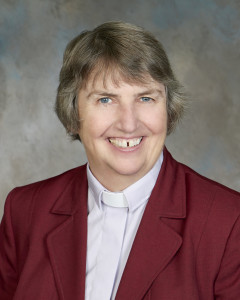 A photo of birds perching on telephone lines fills the front cover of the book, “Mobbing,” by Maureen Duffy and Len Sperry. The small creatures look as innocuous as notes resting on lines of music. However, the birds get center attention because of their tendency to join together to overtake larger animals. Recent studies show that if two particular birds have bonded to mob their prey once, the likelihood of their banding together in the future to gain advantage over another target grows exponentially. But the book isn’t about birds. It’s about human beings.
A photo of birds perching on telephone lines fills the front cover of the book, “Mobbing,” by Maureen Duffy and Len Sperry. The small creatures look as innocuous as notes resting on lines of music. However, the birds get center attention because of their tendency to join together to overtake larger animals. Recent studies show that if two particular birds have bonded to mob their prey once, the likelihood of their banding together in the future to gain advantage over another target grows exponentially. But the book isn’t about birds. It’s about human beings.
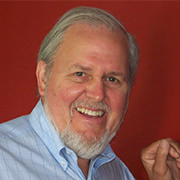
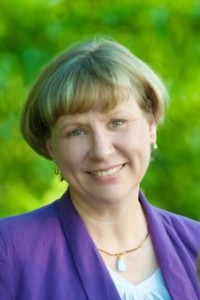








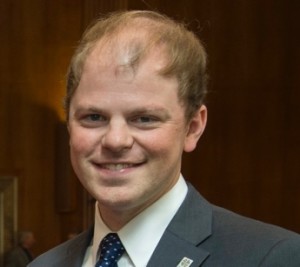
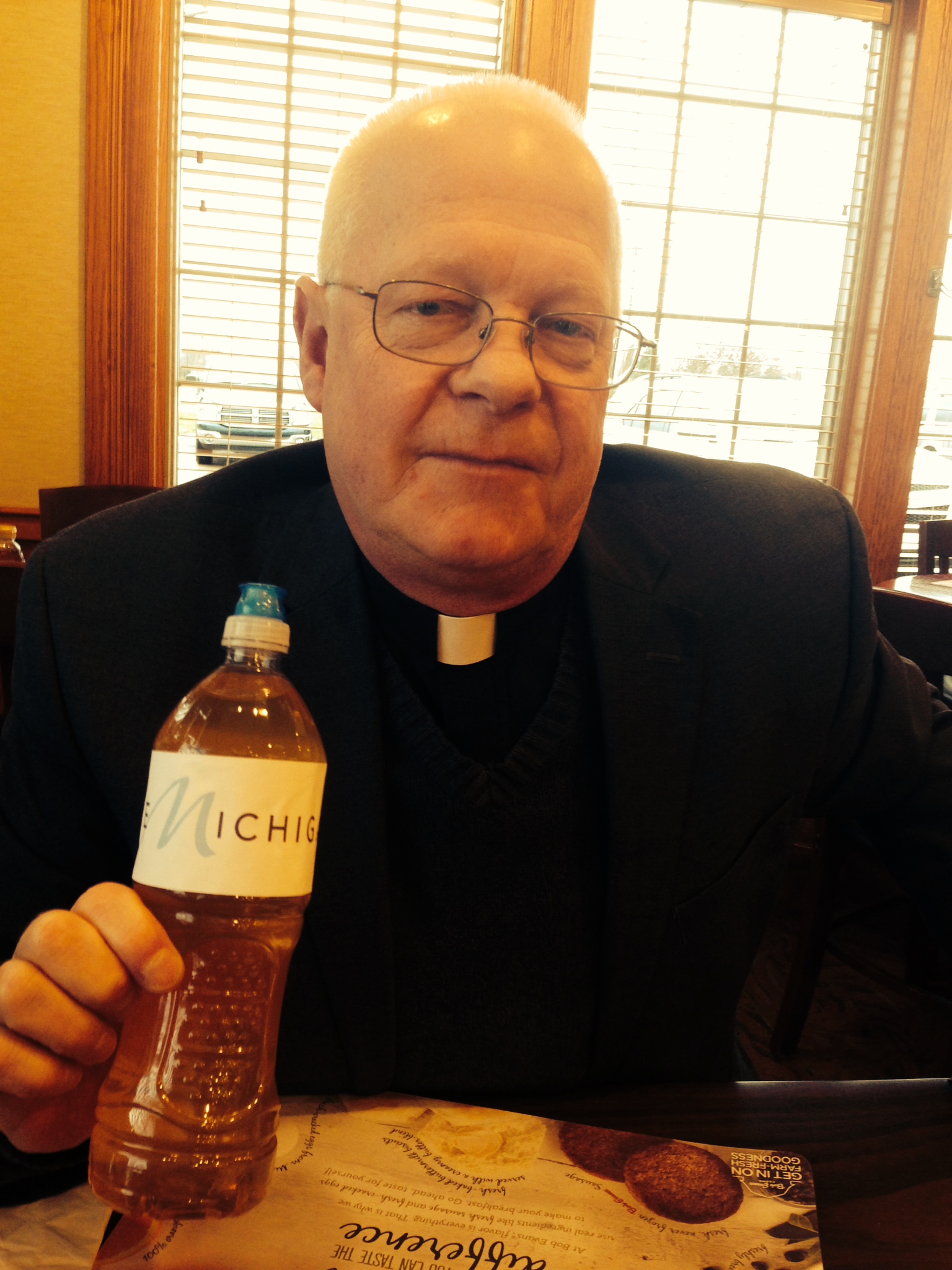 Flint will need water for a long time to come. Find out how you can help by visiting the Southeast Michigan Synod website at
Flint will need water for a long time to come. Find out how you can help by visiting the Southeast Michigan Synod website at 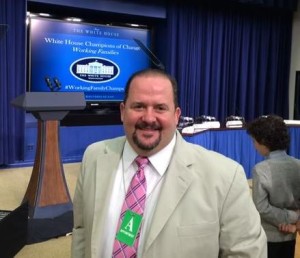
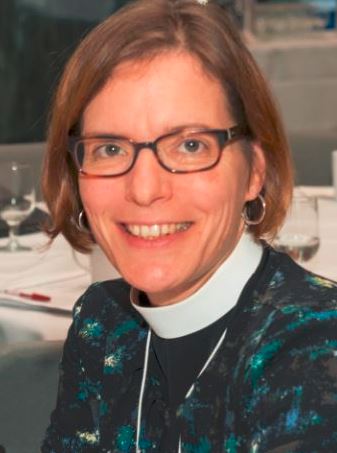 Fasting, prayer and almsgiving are the traditional disciplines of Lent. In the Gospel reading for Ash Wednesday, Jesus addresses these three acts of piety already well known in rabbinic teaching. Two thousand years later they continue to top the list of
Fasting, prayer and almsgiving are the traditional disciplines of Lent. In the Gospel reading for Ash Wednesday, Jesus addresses these three acts of piety already well known in rabbinic teaching. Two thousand years later they continue to top the list of